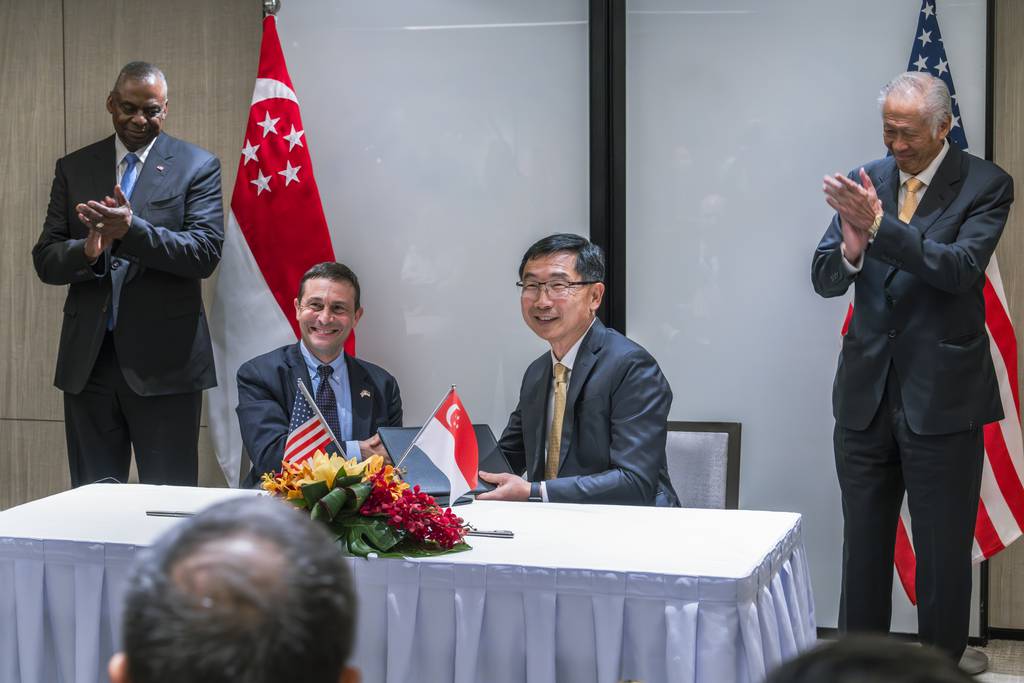
SINGAPORE — The U.S. and Singapore have agreed to collaborate more closely on defense innovation as part of a broader effort by the Pentagon to pair the American defense industry with countries in the Indo-Pacific region.
Signing the agreement on the U.S. side was Doug Beck, head of the Defense Innovation Unit, which helps the Defense Department adopt commercial-style technology.
In line with that mission, the new memorandum of understanding commits the two countries to cooperate on adopting tech that has both commercial and military uses. The main areas of focus for this work will be on maritime security and counter-drone systems, according to a Defense Department statement.
Part of the agreement will include “joint challenges” for counter-drone tech launched from ships, while another portion focuses on making systems resilient to jamming and other electronic warfare capabilities. The challenges are a way to kick-start the two countries’ work, Beck said in an interview.
The dates for each challenge aren’t set, but Beck said the goal is to start them both in about a month. The U.S. and Singapore will agree on the specific goals and criteria, and then allow companies from either country to apply. From there, the U.S. and Singapore will decide what kind of contracting tool they want to use to buy the offerings.
“That’ll yield winners that will then go into each of our systems,” he said.
These challenges resemble one held earlier this year by the U.S., the U.K. and Australia as part of AUKUS, a defense pact focused on nuclear-powered submarines and other advanced technology. The AUKUS competition allows defense companies from all three countries to compete around a problem focused on electronic warfare.
Alongside Beck, U.S. Defense Secretary Lloyd Austin met with Singaporean Prime Minister Lawrence Wong on the sidelines of the Shangri-La Dialogue, a security summit that draws officials across the Indo-Pacific. The event is hosted by the London-based International Institute for Strategic Studies think tank.
One of the U.S. government’s top messages at the conference — as it has been during President Joe Biden’s term — has been linking America’s defense industry with other countries.
In the last several years there have been multiple agreements to do so. General Electric agreed last year to manufacture fighter jet engines in India for the country’s Air Force. Japan and the U.S. agreed to work together on the development of glide-phase interceptors, which are meant to counter hypersonic missiles. And under AUKUS, American and Australian defense companies are working closely together.
Such co-development has become a higher priority amid the war in Ukraine, which has highlighted issues in America’s own ability to surge production of key weapons as well as innovate against the latest challenges, including electronic warfare.
Beck said the first time he spoke with partners in Singapore was last fall, shortly after he took his current job. He cited this agreement, seven months later, as evidence of how fast the partnership could move.
“We said let’s make something happen,” Beck said.
Noah Robertson is the Pentagon reporter at Defense News. He previously covered national security for the Christian Science Monitor. He holds a bachelor’s degree in English and government from the College of William & Mary in his hometown of Williamsburg, Virginia.
- SEO Powered Content & PR Distribution. Get Amplified Today.
- PlatoData.Network Vertical Generative Ai. Empower Yourself. Access Here.
- PlatoAiStream. Web3 Intelligence. Knowledge Amplified. Access Here.
- PlatoESG. Carbon, CleanTech, Energy, Environment, Solar, Waste Management. Access Here.
- PlatoHealth. Biotech and Clinical Trials Intelligence. Access Here.
- Source: https://www.defensenews.com/pentagon/2024/05/31/us-singapore-to-work-together-on-counter-drone-electronic-warfare-tech/



